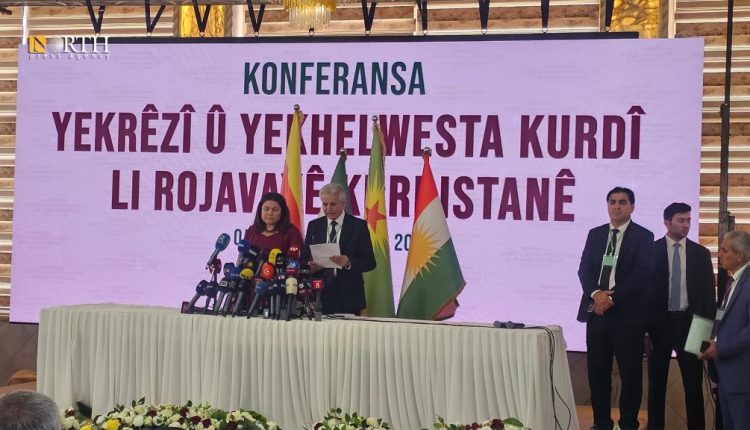Turkish Nationalist Leader Criticizes Kurdish Unity Conference in Northeast Syria
By Kardo Roj
ANKARA, Turkey (North Press) – Devlet Bahçeli, the head of Turkey’s Nationalist Movement Party (MHP), issued strong criticism on Tuesday against a Kurdish political conference held last weekend in Qamishli, northeast Syria, under the joint auspices of the United States and France.
The event, titled “Conference for Kurdish Unity in Syria,” brought together representatives of the Democratic Union Party (PYD) and the Kurdish National Council (ENKS)—two major Kurdish blocs that have long been at odds. The gathering marked a renewed attempt to bridge intra-Kurdish divisions and promote a unified Kurdish stance on Syria’s future.
In a lengthy post on his official account, Bahçeli denounced the conference’s final communique, claiming it undermined Syria’s territorial integrity and was orchestrated under “foreign influence.”
Bahçeli particularly condemned the conference’s advocacy for a decentralized governance system in Syria—a model long supported by the Autonomous Administration of North and East Syria (AANES), which governs vast parts of the country’s northeast with security provided by the Syrian Democratic Forces (SDF).
“This is a violation of the agreement signed in March between Syrian transitional president Ahmed al-Shara and SDF Commander Mazloum Abdi,” Bahçeli alleged, referring to an accord reached earlier this year as part of preliminary transitional arrangements between Damascus and the SDF.
Bahçeli’s statement came amid growing debate over the future structure of the Syrian state. While pro-government factions advocate for a return to centralized rule, Kurdish political bodies and AANES continue to call for a decentralized, pluralistic model that reflects the country’s diversity and ensures regional representation.
Bahçeli’s remarks echoed a statement issued Sunday by the Syrian presidential office, which also rejected the outcomes of the Kurdish unity conference. The statement criticized recent moves by the SDF, claiming they contravened prior agreements, though details of these accords remain ambiguous.
Analysts note that such responses may reflect political maneuvering in anticipation of formal negotiations over Syria’s long-delayed political transition. The Kurdish-led SDF and AANES remain key actors in northeast Syria, holding de facto autonomy in areas liberated from the Islamic State (ISIS) and governed by local councils.
While Kurdish representatives have consistently emphasized their commitment to Syria’s unity, they have also stressed the necessity of decentralized governance as a safeguard against authoritarianism and as a means to ensure regional stability.
The Qamishli conference was reportedly organized with facilitation from American and French officials, indicating continued Western interest in supporting intra-Kurdish dialogue and inclusive governance in post-conflict Syria.
However, Turkish officials have long expressed discomfort with Western engagement in Kurdish political processes, particularly those involving the PYD or the SDF, which Ankara views with suspicion.
Bahçeli also called on Turkey’s pro-Kurdish Equality and Peoples’ Democracy Party (EDHP), some of whose members reportedly attended the conference, to publicly reject its outcomes—a move viewed by observers as part of Turkey’s broader strategy to manage Kurdish political activity both domestically and regionally.
The resurgence of political dialogue among Kurdish factions under international sponsorship signals a renewed attempt to unify vision and strategy as Syria faces a potential transition phase. Yet, backlash from regional actors underscores the fragile political terrain in which these efforts unfold.
The SDF’s ongoing security role, coupled with AANES’s civil governance structures, positions northeast Syria as a unique political entity within the country’s broader landscape. While the call for decentralization continues to stir tensions, it remains central to the Kurdish position on Syria’s future.
As external and internal actors continue to weigh in, the outcomes of initiatives like the Qamishli conference may shape not only Kurdish relations but also broader negotiations on the political restructuring of Syria.

